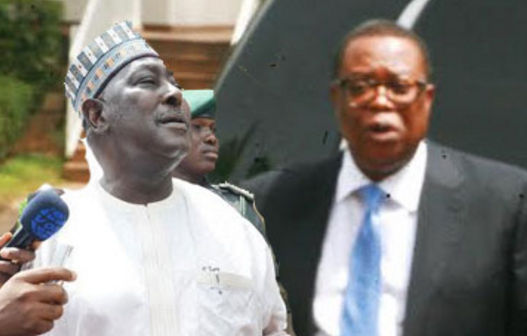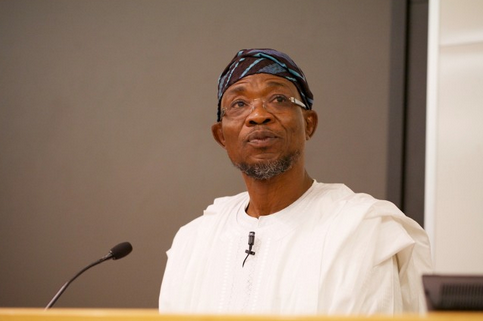By Idowu Samuel
It is not in doubt that a good number of Nigerians are averse to corruption and other tendencies leeching unto it and would prefer to fight the incubus to stand still to save their country. Nigerians had demonstrated capacity to incinerate the menace two years ago when they stopped the past government headed by former President Goodluck Jonathan adjudged as corrupt from renewing its tenure.
Decay of infrastructure, widening influence of terrorism, gangsterism, armed robbery, prostitution, pipeline vandalism, unbridled stealing from the Nigeria’s commonwealth, flaunting of ill-gotten wealth, forlorn hope on the future, mass unemployment, youths restiveness, dwindling international image and other limitless vices were evidence of corruption which combined and threatened to wreak Nigeria under the past government. But the need to revive hope on Nigeria prodded the electorate to invest trust in the leadership of President Muhammadu Buhari.
Since he came on board, President Buhari administration has made visible efforts to tackle the monster of corruption. His government, using the TSA as a tool has been preventing the systemic stealing of government funds. The government had fought to prevent the culture of budget padding by legislators. It has fished out ghost workers, totalling 43,000 within the Federal Civil Service, saving Nigeria over N50 billion monthly. The government has taken several initiatives on saving the cost of governance to prevent waste. It has continued to make efforts to recover monies looted by officials of past governments, while using part of recovered loot to
fund the budget.
Not too long ago, the government moved against top level judges alleged to have criminally offered justice to the highest bidders, at different times. Although the action by the government attracted initial public outcry,
Nigerians understood better when the National Judicial Council (NJC) sacked some judges on alleged acts of corruption. It was a process aimed at sanitising and safeguarding the judiciary. It was also to strengthen jurisprudence in Nigeria, now and in the future.
Notwithstanding, President Buhari has been fighting corruption with studied caution, using the law to guide every single step he takes.
Months ago, the Senate President Bukola Saraki ran into a high storm along with some principal officials who were allegedly accused of forging the Senate Standing Order to smoothen the process of their election. Even at that, Saraki continued to have running battles with the Code of Conduct Bureau and Tribunal on alleged false assets declaration. There were allegations also that some leaders of the Senate acquiesced in padding the 2016 Budget thereby preventing early passage. In all, concerned Nigerians mounted pressure on the President to move in and break heads in the legislature.
Some watchers of the Nigerian politics had insisted that the Senate President vacate his seat in line with convention to allow the probe of allegations against him. The pressures notwithstanding, President Buhari stuck to the principle of Separation of Powers, preferring the law to take its natural course. The fact now is that the allegations against the legislators are still pending before the court of law and in the court of public opinion in Nigeria.
Ironically, the Senate which is barely overcoming its trauma on allegations of corruption levelled against its principal officials appears more interested in putting the executive arm of government in pillory. Many had
opined that the sustained bashing of cabinet members with smears of corruption is aimed towards putting the President in a fix for political reasons. To analysts, labelling the Secretary to the Government of the Federation (SGF), Babachir David Lawal and the Czar of corruption in Nigeria, Ibrahim Magu as corrupt and good for immediate sack is an issue that calls for deeper reasoning.
The hues and cries over the allegations by the Senate against the SGF and the EFCC Chairman notwithstanding, President Buhari again reacted with stoic intervention, ordering the Attorney General of the Federation, Abubakar Malami to institute a probe. The President as usual, set sentiment aside in taking the action which many in Nigeria have continued to applaud.
It is more instructive when the President, through his spokesman, Malam Garba Shehu said he would await the outcome of the investigations against the aides before taking action.
What the President seemed to have achieved by his order of probe was a prevention of media trial of Babachir and Magu amid perceived failure by the lawmaking arm to give them fair hearing before labelling them as
corrupt. In all civilised climes, presumption of innocence is a legal right of the accused in criminal trial. The Senate and critics are probably oblivious that under the UN’s Universal Declaration of Human Rights,
article 11, the burden of proof is on the prosecutor who needs to present compelling evidence to prove that the accused is guilty beyond reasonable doubt.
However, precedence in advanced democracies had proved President Buhari right on his resolve to assign the Attorney General with the task of probing the SGF and the EFCC Chairman.
Years back, the government of the United States had drafted its Attorney General, Janet Reno to probe wide ranging allegation of abuses against a then sitting President, Bill Clinton, more so at a time the illicit affair he allegedly had with then White House Intern, Monica Lewinsky blew into the open. Although Clinton survived the storm, but the US judicial system remained untainted after profiling the alleged infamy against then President, while the nuances of his trial remains in the public domain till date.
Similarly in Israel, the Attorney General Avichai Mandelblit undertook the task of probing allegations against Prime Minister Benjamin Netanyahu, standing up to the storm generated by the media on account of denial by Netanyahu of any wrongdoing. The Attorney General succeeded in probing suspicion of money laundering involving the prime minister and an unnamed senior Justice Ministry official, among others.
However, President Buhari had taken his action away from the realm of conjectures by refraining from drafting both the Economic and Financial Crimes Commission (EFCC) and the Independent Corrupt Practices and Other Related Offences Commission (ICPC) to handle the probe of the SGF and Magu. That, in any case, is to cut off possible sympathy for the accused by the agencies.
In all, the unspoken motive by President Buhari on probing his aides is to ascertain whether or not the allegations preferred against them had political undertone with tinge of vendetta and primordial sentiments. For now, all – protagonists and antagonists – should tarry and await the outcome of the probe by the Attorney General.
Idowu Samuel, Journalist and Public Affairs analyst, writes from Abuja

